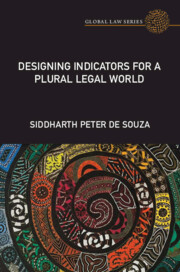Book contents
- Frontmatter
- Dedication
- Contents
- Acknowledgements
- 1 Introduction
- 2 ‘Meanings’, ‘Trust’ and ‘Power’: Critical Perspectives on Legal Indicators
- 3 Rule of Law Promotion, Legal Indicators and Legal Pluralism
- 4 Epistemic Diversity and Voices from the Global South: Countering the Managerial Implications Of Measuring Justice
- 5 A Capability Approach to Access to Justice in Plural Legal Systems
- 6 Conclusion
- Appendix
- Bibliography
- Index
5 - A Capability Approach to Access to Justice in Plural Legal Systems
Published online by Cambridge University Press: 29 July 2022
- Frontmatter
- Dedication
- Contents
- Acknowledgements
- 1 Introduction
- 2 ‘Meanings’, ‘Trust’ and ‘Power’: Critical Perspectives on Legal Indicators
- 3 Rule of Law Promotion, Legal Indicators and Legal Pluralism
- 4 Epistemic Diversity and Voices from the Global South: Countering the Managerial Implications Of Measuring Justice
- 5 A Capability Approach to Access to Justice in Plural Legal Systems
- 6 Conclusion
- Appendix
- Bibliography
- Index
Summary
This chapter seeks to build upon the argument for epistemological diversity proposed in the last chapter by embracing legal plurality and including bottom-up perspectives in understanding and evaluating access to justice, and how people use the law to resolve their grievances. It also calls for engaging with concepts and narratives from the Global South, with the understanding that there are many worlds with different knowledge systems and there is a need to engage with these epistemologies and values to present a truly global legal indicator. To do this, this chapter draws on recent work that recognizes the need for people-centred approaches to address justice problems, and extends these approaches by offering a framework and methodology to measure access to justice in plural legal systems where there are competing forums for dispute resolution, and varied principles, ideas and norms.
Having introduced concepts of ‘access to justice’ and ‘legal pluralism’ in the previous chapters, this chapter analyses how these two concepts can be developed using the capability approach first proposed by Amartya Sen. The purpose of focussing on human capability is to understand and map effective opportunities that people have in order to lead lives that they consider valuable, and in this regard understand how they can also have meaningful access to justice. I argue that if we wish to evaluate how justice systems function, we need to do so by understanding them from a user perspective and by looking at how people experience them and find ways to resolve their grievances.
There are several existing legal indicators. However, a majority of them are designed primarily to measure the rule of law from an institutional approach, with a state-centric notion of justice delivery. In these evaluative tools, the rule of law is measured in terms of institutions responsible for the administration of justice, such as the police, prisons, and courts. The conceptual aspects of these tools are designed primarily for formal justice systems, which are then seen as aspirational models of justice delivery and models to be replicated in other geographies. These indicators, as we have shown in the previous chapter, do not accurately represent the Global South due to the pluralities of dispute resolution institutions that operate with different concepts, procedures and substantive values.
- Type
- Chapter
- Information
- Designing Indicators for a Plural Legal World , pp. 164 - 203Publisher: Cambridge University PressPrint publication year: 2022
- 2
- Cited by



